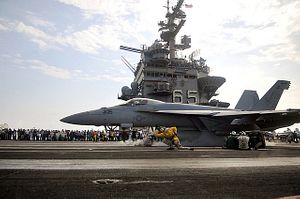U.S. President Barack Obama has spoken urbi et orbi, to American citizens and the world, about fighting the Islamic State (IS). To his credit he did not promise a cakewalk. Some of his rhetoric, such as looking forward to when “those who offer only hate and destruction have been vanquished from the Earth” bears no connection with reality. But, like “God bless America,” it is part of the incantations Americans, unlike Europeans, need to hear.
Obama’s speech did not go into details. This was unavoidable. It would be unwise to let the enemy know what are America’s strategy and operational plans (strategy, as Clausewitz reminds us, should not be confused with policy).
Obama made it clear that the U.S. will not send massive ground forces to Mesopotamia. Given the failure of the American expeditions in Iraq and Afghanistan, a President John McCain or a President Mitt Romney would have made the same decision. American voters don’t want to fly large legions to Iraq. The lessons of the recent past are that it would anyhow not bring about success unless the U.S. brought back conscription to station millions of soldiers and Marines for a century or two.
The U.S. will limit itself to airpower, intelligence, equipment, money and diplomacy. But, with the exception of U.S. special forces, air force targeting personnel, and advisers, the “boots on the ground,” will be neither American nor from close allies (NATO, Australia, Japan and the ROK are not providing army divisions to fight this war). But if IS is defeated, what happens will be decided by the armies and militia that will occupy it. Humans are land mammals. They can be influenced by airpower and naval action but in the end soldiers and policemen decide what happens in human communities.
Unfortunately for the United States, the forces aligned against the IS are the Iranian-supported Iraqis, Iran, Kurdistan, Turkey, Saudi Arabia, the UAE, the remnants of the Assad régime, and other groups. Some are rabidly anti-American, others, such as Kurdistan, Turkey and Saudi Arabia, are not anti-U.S. but have goals that are often incompatible with American objectives.
The question for East Asia is how the war with IS will impact American power in the Asia-Pacific.
An optimistic answer for U.S. allies, and thus pessimistic for American enemies, is that American involvement will remain peripheral. The U.S. will provide relatively low cost (by the standards of the Pentagon’s budget) assistance but not more. American actions may not achieve anything useful, but at least the U.S. will not be sucked into Southwest Asia as it has been for over a decade. If, however, the result is a degradation of the IS without negative collateral effects (such as a much stronger Iran), the cost-benefits of the operation will be positive for Washington and its allies.
There is, however, the possibility that U.S. involvement will grow bigger. It’s almost impossible to think that U.S. Army and Marine Corps brigades and divisions will return to Iraq. But limited air strikes could morph into bigger ones lasting years, more “advisers” and special operations teams could deploy, logistics support could become larger.
Additionally, today’s fight is against the self-proclaimed Caliph and his men. But will it still be so in six months? North Korea is not about to ally with the U.S. to attack South Korea, nor will the U.S. jointly invade Japan with China. But in the area between the Nile and the Persian Gulf, realpolitik, religious fervor, ethnic and tribal rivalries, collapsed states, sub-national actors, and domestic instability make for rapidly changing alignments. Cooperation and confrontation can coexist in ways that Americans find surprising. This could lead to U.S. “partners” suddenly turning against America and bring about a U.S. counter-reaction.
Thus, we can envisage many scenarios, such as an Iraqi Arab-Kurdish fight, a civil war inside the failed Iraqi state, conflicts involving Turkey or Iran, and so on. Some anti-IS participants may switch sides and join forces with the Caliphate against more dangerous foes. For example, it should be remembered that Saudi Arabia has greater affinity with the IS, with whom it shares theological and ideological tenets, than with many other parties to the conflict.
Thus, for U.S. allies in the region, the best outcome would be for Washington to realize that its ability to make Mesopotamia a less horrible place is limited. For Beijing and Pyongyang, however, the more resources Americans invest in the War of the Iraqi Succession, the better it will be for them.
Robert Dujarric is Director, Institute of Contemporary Japanese Studies, Temple University Japan. robertdujarric@gmail.































